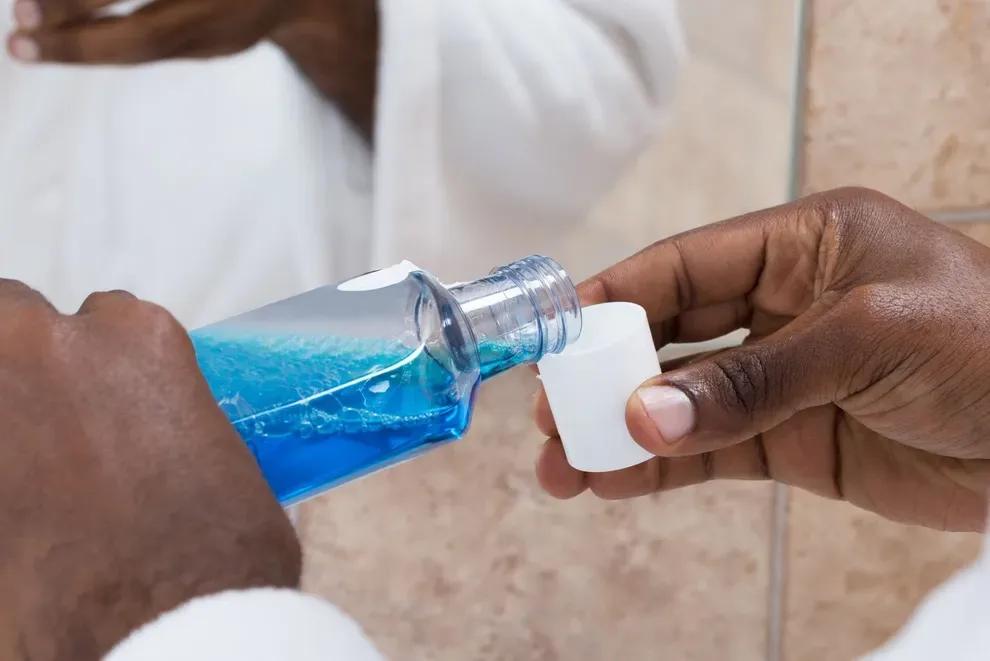Mouthwash For Gums | Top Brands for Gingivitis & Gum Disease

Table of Contents
- Why Gum Health Matters
- Understanding Gum Disease
- Top Mouthwashes
- How to Use Mouthwash
- Best Mouthwashes for Gums FAQs
- References
While mouthwashes are often thought of primarily as a way to freshen breath, some mouthwashes may help to promote overall gum health. Mouthwashes that are designed to kill bacteria can guard against gingivitis and gum disease.
Why Gum Health Matters
Gum health is often neglected when considering overall health and well-being. One might make health-related goals related to their weight, stress level, or quality of sleep, but few set out to reduce gum inflammation or improve their gum care.
This may change after visiting the dentist and learning that your gums are in trouble, and you’re on your way to gum disease. Gum health is not only vital to your oral health, but it may also be a key indicator of your overall health.
Gum disease is linked to a number of chronic health problems, including diabetes and heart disease.
Fortunately, there are steps you can take to improve your gum health. While it’s easier to treat gum problems early on (or prevent them altogether), it’s never too late to take control of your gum and oral health.
An important step in improving gum health is maintaining a good oral hygiene routine. This includes brushing twice a day, flossing daily, and using an antimicrobial mouthwash, particularly one that’s formulated especially for gum care.
Understanding Gum Disease & How Mouthwash Can Help
Gum disease is a serious and common problem. According to the Centers for Disease Control and Prevention (CDC), over 47 percent of adults over the age of 30 in the U.S. have some form of gum (periodontal) disease. The number jumps to over 70 percent for adults over the age of 65.
When used properly and as part of a daily oral hygiene routine, mouthwash can help.
The National Institutes of Health defines gum disease as an “infection of the tissues that hold your teeth in place.” If left untreated, it can damage the bones around your teeth and lead to tooth loss.
Your mouth is a delicate ecosystem containing billions of bacteria. Some bacteria are helpful, “good” bacteria, while other bacteria are harmful and cause oral health problems. One type of “bad” bacteria is plaque — a sticky film of bacteria that is continuously forming on your teeth.
The plaque in bacteria creates acids in your mouth after you eat or drink. These acids eat away at teeth and produce substances that irritate the gums, causing tooth decay and gum disease.
Untreated plaque can also harden into tartar (also called dental calculus), which can worsen decay and gum problems. Tartar can only be removed professionally.
Everyone has plaque, but some people are more prone to it, including those who smoke, take medications that cause dry mouth, or have a diet that’s high in starches or sugars.
Too much plaque and the complications that come with it are linked to poor oral hygiene.
This doesn’t mean that people with plaque, cavities, or gum problems don’t brush their teeth or floss. They may keep up with a daily dental routine, but that routine may not be effective.
Plaque tends to accumulate in hard-to-reach areas of the mouth, like the narrow spaces in between teeth or close to the gum line. It can be hard to get to these areas every time you brush. And the more plaque and other bacteria left behind, the more it can reproduce and cause oral health problems.
This is why flossing is a key part of any dental hygiene routine. Getting in between the teeth with dental floss, interdental brushes, or flossing picks can help reduce plaque in between teeth.
Mouthwash is another important tool and should also be a must-have for any oral hygiene plan.
Antimicrobial and antiseptic mouthwashes contain ingredients that kill or deactivate harmful bacteria. When used properly, mouthwash is an effective tool in reducing plaque buildup, especially as it can reach those hard-to-clean areas in the mouth.
Top Mouthwashes
Any mouthwash accepted by the American Dental Association (ADA) will benefit your oral and gum health even if “gum care” isn’t featured in the name.
This includes the top mouthwashes on the market, such as these:
Listerine Total Care Alcohol-Free Anticavity Fluoride Mouthwash: This offering from Listerine claims to kill 99 percent of mouth bacteria that it comes in contact with within 60 seconds. Plus, it contains fluoride to prevent tooth decay. This formula is also alcohol-free, which means it won’t contribute to dry mouth.
It costs about $15 for a two-pack of 1-liter bottles on Amazon.
ACT Anticavity Fluoride Mouthwash: With its strong concentration of cavity-preventing fluoride and budget-friendly price tag, this alcohol-free choice is a top pick among dentists and shoppers. It claims to kill the germs that cause bad breath with ingredients like menthol and Cetylpyridinium chloride (CPC), a bacteria-fighting antiseptic.
It costs about $5 for an 18-ounce bottle on Amazon.
Scope Get Fresh Mouthwash: With an alcohol formula and strong mint flavor, this Scope classic offers a powerful refresh for the mouth and a bacteria-fighting dose of CPC for the gums.
It costs about $5 for a 1-liter bottle on Amazon.
Crest Pro-Health Clinical CPC Anti-Gingivitis/Antiplaque Oral Rinse: Crest claims this alcohol-free formula is their most advanced ever, with capabilities that include reducing plaque, preventing plaque regrowth, and preventing and reversing gingivitis.
It costs about $20 for a pack of two 473 ml bottles on Amazon.
Listerine Freshburst Antiseptic Mouthwash: A strong mint flavor makes this rinse an intense “wake-up call” for the mouth. Different alcohols and essential oils help to battle gingivitis and plaque buildup.
Listerine Ultraclean Zero Alcohol Tartar Control Mouthwash: This alcohol-free formula features a milder mint flavor and claims to fight tartar stains and buildup. It costs about $11 for a 1-liter bottle on Amazon.
Dental Herb Company Tooth & Gums Tonic: This unique formula has thousands of positive reviews on Amazon. It features natural ingredients like echinacea, red thyme, and lavender to support gum health and fight inflammation.
It costs about $40 for an 18-ounce bottle (approximately a two-month supply) on Amazon.
How to Use Mouthwash
The best instructions on how to use your mouthwash are the ones on your bottle. Some mouthwashes may have specific instructions for their intended use.
Generally, most mouthwashes have the same basic instructions.
Use the amount of mouthwash instructed by your dentist or in the instructions.
Swish the mouthwash around in your mouth (actively) for about 30 seconds.
Spit the mouthwash out. Don’t swallow it.
Avoid mouthwash that contains alcohol if you have any signs of (or a history of) dry mouth.
Don’t use mouthwash right after brushing with a fluoride toothpaste. It will rinse the beneficial fluoride away.
Mouthwash is never a replacement for brushing or flossing.
If you have severe gum problems, your dentist may recommend a prescription-strength mouthwash.
Set a timer to make sure you are swishing the mouthwash long enough for it to be as effective as possible.
Best Mouthwashes for Gums Frequently Asked Questions
Most mouthwash is beneficial to the gums, although some people may have conditions or sensitivities that could contradict certain mouthwash products. Someone with dry mouth, for example, should avoid mouthwash with alcohol, as it could make their dry mouth worse and thus worsen their oral health.
Mouthwash can support good gum health and help to heal mild gum inflammation by reducing plaque, which produces gum-irritating substances.
However, mouthwash cannot remove tartar. Tartar contains bacteria that causes gum irritation and inflammation. If you have gum problems and tartar, you’ll need to visit a dentist for a cleaning to thoroughly treat your gums.
Some mouthwash is formulated specifically for gum care. Different products make different claims. Many kill over 90 percent of germs in the mouth, while others even treat and reverse gingivitis. Talk to your dentist about the best options for your needs.
Listerine offers a variety of mouthwash options, including formulas that are designed specifically to help with gum problems like gingivitis. Treating gum disease, however, requires the care of a qualified dentist.
